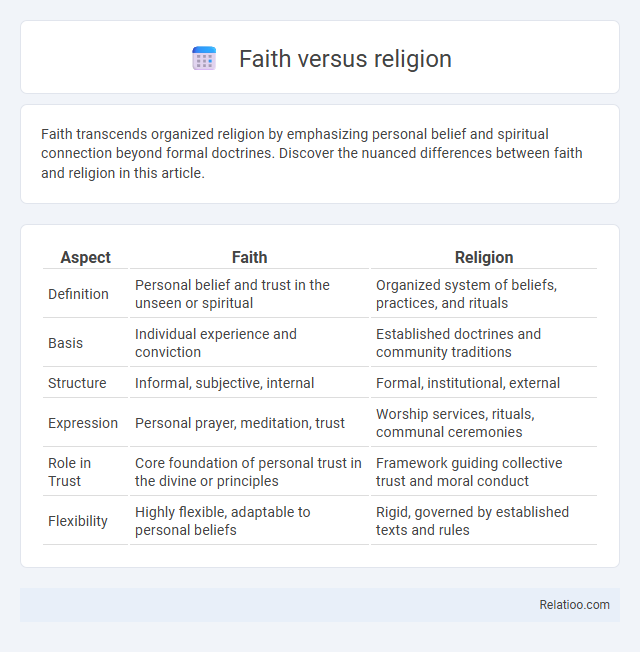Faith transcends organized religion by emphasizing personal belief and spiritual connection beyond formal doctrines. Discover the nuanced differences between faith and religion in this article.
Table of Comparison
| Aspect | Faith | Religion |
|---|---|---|
| Definition | Personal belief and trust in the unseen or spiritual | Organized system of beliefs, practices, and rituals |
| Basis | Individual experience and conviction | Established doctrines and community traditions |
| Structure | Informal, subjective, internal | Formal, institutional, external |
| Expression | Personal prayer, meditation, trust | Worship services, rituals, communal ceremonies |
| Role in Trust | Core foundation of personal trust in the divine or principles | Framework guiding collective trust and moral conduct |
| Flexibility | Highly flexible, adaptable to personal beliefs | Rigid, governed by established texts and rules |
Defining Faith and Religion
Faith represents a deep, personal trust or belief in something greater, often spiritual or divine, without requiring empirical proof. Religion encompasses organized systems of beliefs, rituals, and practices shared by a community, structured around doctrines and moral codes. Defining faith emphasizes individual conviction and experiential trust, while defining religion highlights collective frameworks and institutional traditions.
Historical Evolution of Faith and Religion
Faith and religion have evolved through distinct yet intertwined historical trajectories, where faith represents personal belief and trust in the divine, while religion embodies organized systems of worship and doctrine. Early human societies expressed faith through animistic and shamanistic practices, which gradually transformed into structured religions like Hinduism, Judaism, and later Christianity and Islam, shaping cultural and moral frameworks. Your understanding of these concepts deepens as you explore their historical evolution, revealing how faith often precedes formal religion and influences its development across civilizations.
Core Differences Between Faith and Religion
Faith centers on personal belief and trust in the intangible, often involving a deep spiritual conviction beyond empirical evidence. Religion encompasses organized systems of beliefs, rituals, and moral codes shared by communities, providing structure and institutional practices. Your understanding of faith is inherently individual, while religion represents collective expressions and frameworks guiding those beliefs.
The Role of Faith in Personal Belief Systems
Faith shapes your personal belief system by providing an internal sense of trust and conviction beyond organized religion. It influences how you interpret experiences and find meaning, often guiding moral decisions and resilience in challenges. Unlike religion, which involves structured doctrines and communal practices, faith centers on individual spiritual confidence and personal connection to the divine or the unknown.
Institutional Structures of Religion
Religion often refers to organized systems of beliefs, rituals, and institutions that establish communal practices and moral codes, whereas faith represents an individual's personal, internal conviction and trust in spiritual truths. Institutional structures of religion, such as churches, temples, and clergy hierarchies, provide formal frameworks for collective worship, doctrinal authority, and social governance. These institutions regulate religious experiences, create communal identity, and preserve traditions, distinguishing organized religion from the more subjective, individualized nature of faith.
Faith Beyond Religious Boundaries
Faith transcends traditional religious boundaries by emphasizing a personal and spiritual trust that is not confined to specific doctrines or rituals. It empowers Your inner resilience and connection to a higher purpose, fostering unity among diverse belief systems. This broader understanding of faith encourages inclusivity and shared human values beyond organized religion.
Social Impact: Faith vs Religion
Faith and religion shape social behaviors and community dynamics in distinct ways. Religion often creates structured institutions and collective rituals that foster social cohesion and shared identity, while personal faith drives individual values and moral decisions influencing social interactions on a more intimate level. Your understanding of the social impact between faith and religion can clarify how belief systems contribute to societal harmony or conflict.
Common Misconceptions
Faith is often mistaken for religion, but faith represents personal belief and trust in a higher power, whereas religion is an organized system of rituals and doctrines. Many assume religion requires faith, yet one can practice religious rituals culturally without genuine spiritual conviction. Misunderstandings arise when faith is seen solely as adherence to religious rules rather than a deeply personal, internal experience.
Interplay of Faith and Religion in Modern Society
Faith and religion often intertwine in modern society, shaping individual identity and community values through shared beliefs and rituals. While religion provides structured doctrines and organized practices, faith represents a personal, internal trust or spiritual conviction that may transcend institutional boundaries. This interplay influences social cohesion, moral frameworks, and the evolving landscape of spirituality in diverse cultural contexts.
Finding Harmony Between Faith and Religion
Finding harmony between faith and religion involves recognizing faith as a personal, internal belief system, while religion serves as the organized structure of practices and doctrines. Both faith and religion can coexist to provide spiritual guidance, community support, and moral frameworks. Embracing the unique strengths of faith's personal conviction and religion's collective traditions fosters a balanced spiritual experience.

Infographic: Faith vs Religion
 relatioo.com
relatioo.com